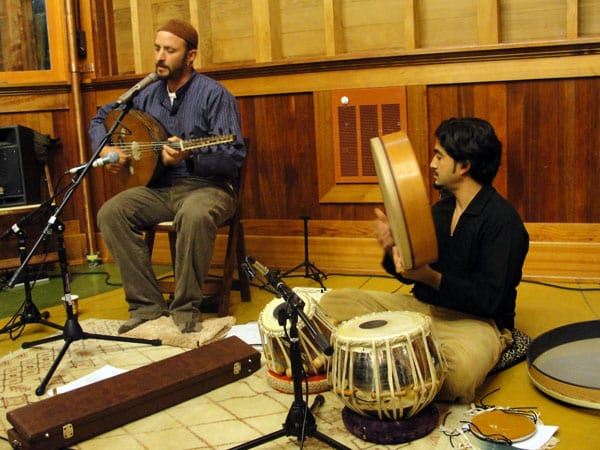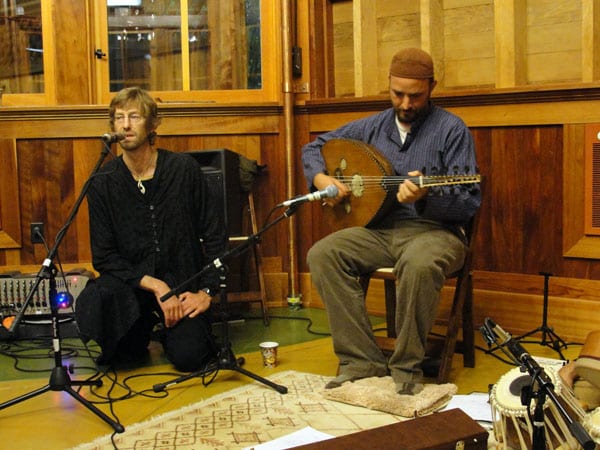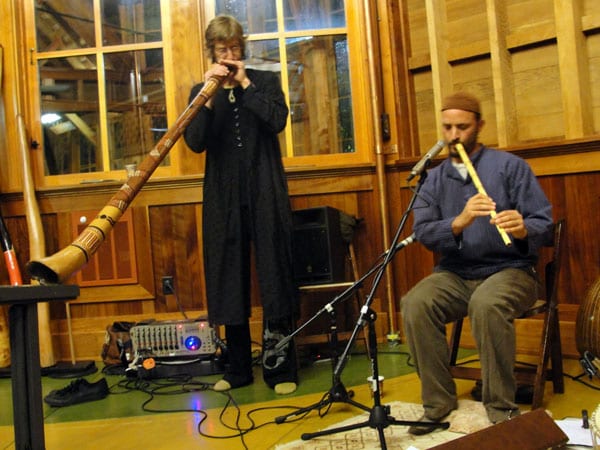Photos by Susan Levy
It was a chance to break out of the confines of Monterey Boulevard and Diamond Street, Sunnyside, Glen Park, and beyond, and go on a musical tour to distant continents.
On Friday, November 4, the Friends of Sunnyside Conservatory presented an evening of world music that spanned Australia, the Middle East, North Africa and India. Travis Wernet, aka “Outlaw Dervish” opened the concert with selections from several of his didjeridu, which he’s been playing for fifteen years. He learned the instrument from aboriginal masters as well as his mentor, Alan Tower.
The didjeridu is a wooden instrument made from trees hollowed out by ants. The northeastern Australian Aborigines developed it over 1,500 years ago. Native women “hunt” for the suitable tree and craft the didge with sanders, sandpaper and chisels. Luckily, Wernet tops well over six feet, as his “didges” were almost as long as he is tall. Four years ago, with the help of the native people, Wernet hunted there for his own; it was among the collection of four didges he brought with him.
The didjeridu has no reed. The sound is made by sheer force of mouth, cheeks, and throat. The result is a deep, rumbling sound one can feel in one’s bones.
Switching continents, the audience was treated to music from North India. Eiyahu Sills, who studied in North India, Turkey, Morocco and Israel, was on “flutes and lutes.” Featured was music played on the oud, a pear-shaped stringed instrument that was a precursor to the lute. With Jason Ranjit Parmar on tabla drums, they collaborated on a couple of ragas, a classical form that uses a series of five or more musical notes forming the basis of the melody.
Following this, they played a ragmala, several ragas in succession, as in “a string of beads.” The duo then played three poems – Arabic, Turkish and Persian – on traditional Middle Eastern flutes, called ney, made of bamboo reeds. “It’s the oldest instrument known to humanity and spans all civilizations,” he noted. It sounded straight from nature as each note tumbled out with a rush of air like the wind. Parmar accompanied Sills on the tabla drums, using the expert technique of complex hand and finger movements. The simple instruments produced music of complexity and emotion.
For a knock-your-socks-off combo, Wernet on didge joined Sills and Parmar for a musical mash up: “Australia meets North African craziness after the Pangaea split,” ad-libbed Wernet.
The finale was a North African sing-along in which the audience’s job was to sing “Hey, Molana” (Oh, my Master) in a repeating give and take.
Then it was time to exit onto Monterey Boulevard, and contemplate the World beyond.
For information about Sunnyside Conservatory and future events: www.sunnysideconservatory.org.


